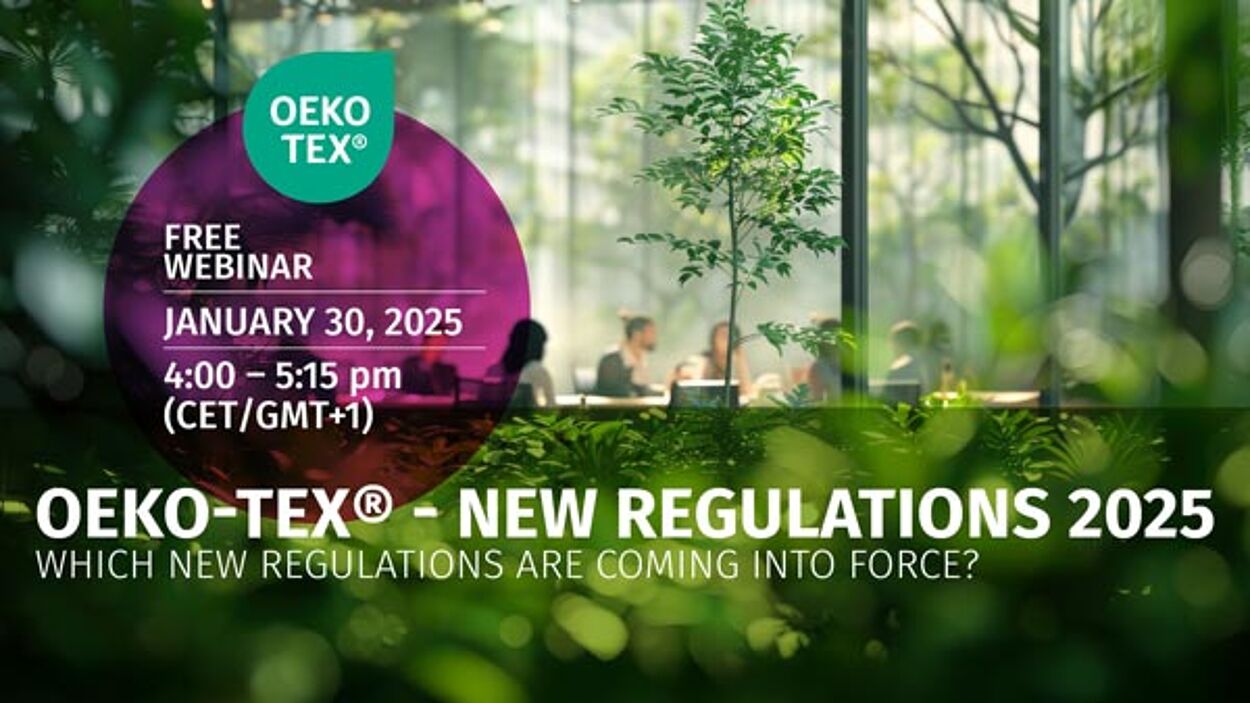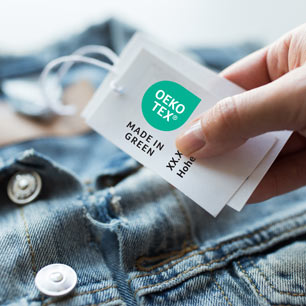The OEKO-TEX® standards are regularly updated to stay ahead of global regulations, incorporate new scientific health data and the latest production methods. Every January, OEKO-TEX® publishes annual updates to the standards as well as the test criteria and limit values - in line with consistent consumer protection and sustainable textiles and leather.
Following a 3-month transition period, annual updates go into effect April 1.
Effective January 1, 2026
- Biodegradability will only be mentioned on ECO PASSPORT certificate if OECD / ISO test results are provided or specific substances are listed as biodegradable by ECHA
- The more reliable hydrolysis method will be used for PFAS detection (used for STANDARD 100 testing since 2024)
Effective October 6, 2025
- PFOS limit value: 25 µg/kg (STANDARD 100, ORGANIC COTTON, ECO PASSPORT)
- PFOS-related substances limit values: 1 mg/kg (STANDARD 100, ORGANIC COTTON)
- New SVHCs added with limit value 1000 mg/kg (STANDARD 100, ORGANIC COTTON, ECO PASSPORT)
- Siloxanes Decamethyltetrasiloxane (CAS: 141-62-8)
- 1,1,1,3,5,5,5-Heptamethyl-3-[(trimethylsilyl)oxy]trisiloxane (CAS: 17928-28-8)
Effective June 2025
Biocides are now forbidden in all OEKO-TEX® STANDARD 100, ORGANIC COTTON and LEATHER STANDARD certified articles for:
- Babies
- Any articles with direct contact to mucous membranes (e.g. diapers for babies and adults, menstrual underwear or tampons
The ban affects all certified articles regardless of their product class.
Annual Updates 2025
Highlights:
- Transparency/OEKO-TEX® Label Check (OEKO-TEX® STANDARD 100, ORGANIC COTTON): The name and address of certificate owners to be included in the label check - Voluntary for the first year, mandatory starting April 2026
- Pre-consumer PET bottles: No longer considered a source for recycled material (OEKO-TEX® STANDARD 100)
- Substances of Very High Concern (SVHC) added to limit value catalogue (OEKO-TEX® STANDARD 100, LEATHER STANDARD, ORGANIC COTTON, ECO PASSPORT)
Bis-(α,α-dimethylbenzyl)-peroxide, Triphenyl phosphate - Leather proof of origin: Required starting January 2025 for all hides, skins and finished leather made from cows or calves (optional for others) - ahead of the EU Deforestation Regulation (OEKO-TEX® LEATHER STANDARD)
- “Organic cotton” claims within OEKO-TEX® MADE IN GREEN must be covered by an OEKO-TEX® ORGANIC COTTON (NOT STANDARD 100) certification, starting April 1, 2026
- Additional Exclusion Criteria (OEKO-TEX® STeP):
- Chemical management - Employee training provided for handling and storage
- Chemical inventory list - Safety data sheet (SDS) easily accessible for each chemical in the facility
- Environmental management - Documented non-compliance and corrective actions + assigned responsible person
- Health and safety - Documented training activities
- Quality management - Known origin of wood/cellulose raw material sourcing, traceable origins for unprocessed or incoming leather
- Social responsibility - Written social policy or code of conduct signed by upper management
- ZDHC Supplier to Zero Program: OEKO-TEX® STeP certification recognized as fully aligned
- Under observation: Microplasticsfrom glitter
- Transition period ended: VOCs are now tested protect consumer health within STANDARD 100, Annex 4
Overviews of the most important changes are summarized for each product below and in the webinar.

Regarding "organic cotton" or "GMO not detectable" in STANDARD 100 Certification
After careful consideration and in line with our commitment to transparency and quality, the mention of "organic" or "GMO not detectable" will no longer be included in STANDARD 100 certification of cotton, effective April 1, 2025.
Certifying cotton as organic is achievable through OEKO-TEX® ORGANIC COTTON.
This decision is driven by our dedication to maintaining the highest standards of safety and compliance.
This pertains specifically to cotton materials. Other organic materials such as hemp, linen or wool remain unaffected. This rule was implemented to enhance our oversight of certified organic cotton, an area where fraud is prevalent. Our aim is to certify only genuinely trustworthy organic cotton as such.
Phased approach to ease transition:
- Starting October 1, 2024
OEKO-TEX® STANDARD 100 certifications with "organic" or "GMO not detectable" within their scope will no longer be issued or renewed for GINNERS and SPINNERS and must be transferred to OEKO-TEX® ORGANIC COTTON. - Starting April 1, 2025
This change will apply to ALL.











